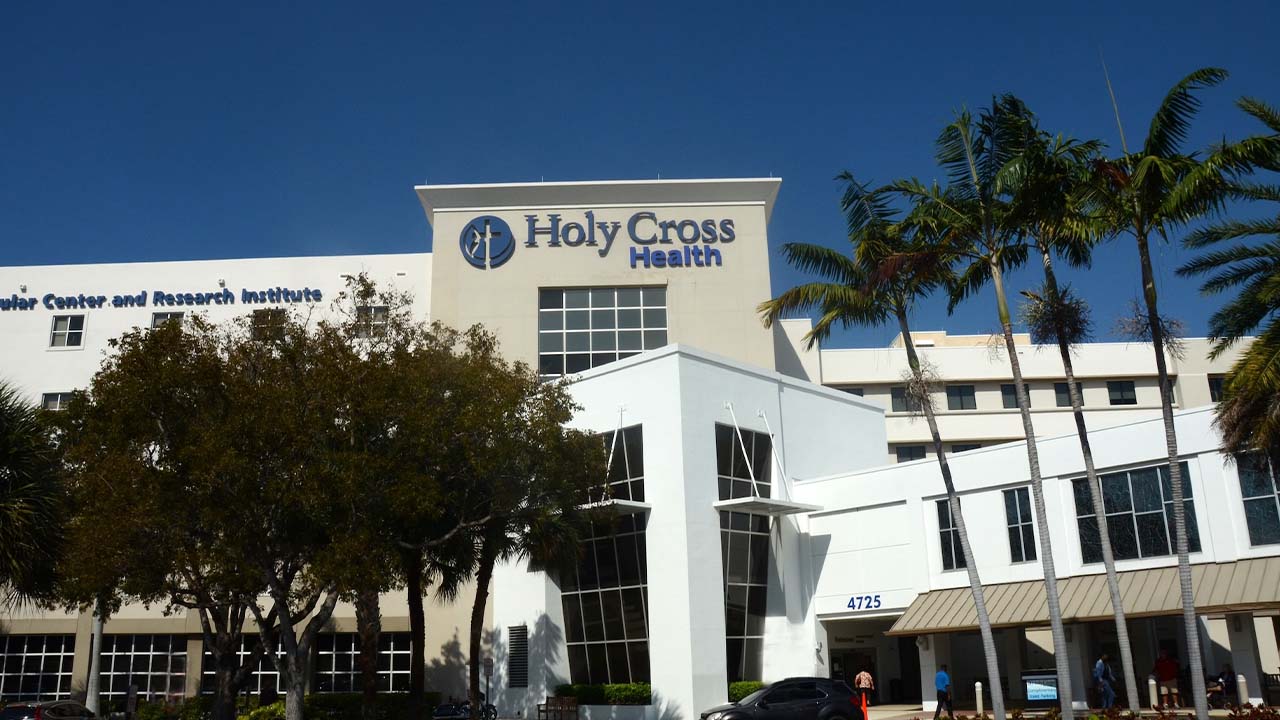[vc_row css_animation=”” row_type=”row” use_row_as_full_screen_section=”no” type=”full_width” angled_section=”no” text_align=”left” background_image_as_pattern=”without_pattern”][vc_column width=”2/3″][vc_column_text]
Using hi-tech to lessen the stress on Alzheimer patients and their caregivers, making house calls to treat wound care, and a more individualized approach in the fight against substance abuse, are among the featured topics in the latest installment of SFBW’s Innovations in Healthcare series.
New treatment being used to prevent future strokes
Delray Medical Center is the first—and only—hospital on the entire east coast of Florida performing a simpler, more effective treatment for carotid artery disease, says Dr. Joseph Ricotta, medical director of vascular surgery and endovascular surgery at Tenet Healthcare. Carotid artery disease is a leading cause of strokes.
Ricotta describes the procedure, called trans carotid artery revascularization, also known as TCAR, as a minimally invasive procedure to prevent strokes. “It’s used for those with carotid artery disease who are asymptomatic but whose blockages are determined by screening, and for those who are symptomatic with strokes or TIAs (transient ischemic attacks,)” he says.
The doctor says data indicates TCAR reduces the risk of stroke significantly compared to at-risk patients only on meds, as well as those receiving older, more traditional forms of endovascular surgery. “TCAR changes the playing field,” Ricotta says.
In the past, a common practice was to first place a stent via a patient’s groin. TCAR requires only a tiny incision. “We put the stent directly in through the neck,” he says. “The beauty of TCAR is that it reverses the flow.”
As a result, the chance of a blood clot reaching the brain post-operatively is greatly reduced compared to other types of surgery. The 30-day stroke risk after surgery using the older method was 4.1 percent, Ricotta says. TCAR reduces the risk down to 0.9 percent. TCAR is only approved for high-risk patients, but Ricotta is optimistic about its future use. “I think ultimately it will be approved for all patients because there are such good results.”
TCAR requires only local anasthesia. The first TCAR was performed at Delray Medical Center on May 31, 2018.
Standing up against
the opioid addiction crisis
Opioid addiction is one of the most serious medical problems facing the healthcare industry today, and Ambrosia Treatment Centers are on the front lines doing battle against this deadly scourge.
“I call opioid addiction a pandemic, not an epidemic,” says Jerry Haffey, Ambrosia Treatment Center’s CEO and founder. “Opioid addiction is the biggest problem we see. It does not discriminate.”
Haffey, a Philadelphia native, says Ambrosia opened its first treatment facility in Port St. Lucie back in October 2007. A second center followed on Singer Island. They’ve since expanded to West Palm Beach, Cherry Hill, N.J., and Beverly Hills, Calif. “At Liz Taylor’s old house,” he adds.
Ambrosia Treatment Centers have about 203 beds in total. “One thing that’s unique is we offer treatment based on different criteria,” Haffey says. The Port St. Lucie center treats substance abusers in the 18- to 25-year-old age group. Singer Island works with those 30 and over. West Palm is for trauma patients. “We assess and place them in the most appropriate facility,” he says. “Our largest facility is 35 beds. We offer individualized care.”
Haffey, who is a registered nurse, has been in the healthcare industry 25 years, and has been active working with the state Legislature in the fight against opioid drugs. He says oftentimes when people become addicted to prescription painkillers, they go on to purchasing street drugs. He says the opioid crisis threatens people in all walks of life. It’s not only a serious problem in impoverished areas like rural West Virginia and Kentucky, but affects high-income areas as well.
An innovative approach in the fight against Alzheimer’s
When a loved one suffers from Alzheimer’s, or any other form of memory disorder, it takes its toll not only on the patient, but on the caregiver(s) as well. As a result, the University of Miami’s health system has embarked on a program called “Care Partners” which utilizes installing high-tech equipment at a patient’s home to help ease the burden on both the patient and caregiver.
Dr. David Loewenstein, a behavioral sciences expert and director of the Center for Cognitive Neoroscience and Aging at UM’s health system, says: “It’s state-of-the-art technology for the home.”
The goals of the program are multifaceted ranging from stress reduction to brain-training exercises. “In our study we try to study both members of the dyad,” Loewenstein says. “It’s a very holistic and innovative program.”
Both members of the dyad, patient and primary healthcare provider, have access to all kinds of programs and chat rooms. This enables them to discuss and share their experiences with others in the study. The computer equipment is brought to a patient’s home and set up by team members. “Once the study is complete, we leave the computer in the home,” says Loewenstein. “We think this is a great opportunity for those with mild cognitive impairment.”
Those suffering from more advanced stages of the impairment are not included in the study. In order to enhance a patient’s brain function, one can even take a “virtual tour” of an art museum on the computer.
Loewenstein says dealing with cognitive dysfunction can be a very stressful experience for all those involved. “We do believe when you increase peoples’ knowledge of the disease, there’s a better health outcome,” he says. “Memory disorder is a disease of the family. We think if we treat the family we’ll have a better outcome. If you can reduce the stress, you can improve the health outcome.”
Loewenstein says they are beginning to realize dealing with Alzheimer’s is a family process. “We do believe there is a synergy when patients and caregivers are treated together.”
An effective, cost-efficient
way to treat wounds
Not only is wound care expensive, but those numbers are rapidly increasing, says Dr. Jeffrey Galitz, CEO and chief medical officer of Woundtech, a leader in the wound management industry.
“We’re a wound-management company,” Galitz says, adding they contract with major health plans to provide patients with home-based care. “We go to patients homes to provide wound-care services. Our services include very advanced services. We can debride a wound. It’s a high level of care.”
Ulcers are becoming more common, Galitz says. “We’re getting more diabetic and fatter,” he says, “and no one’s coming up with a wound vaccine.”
By offering patients in-house care, Woundtech is able to cut costs dramatically, Galitz says. “We don’t perform services that aren’t needed,” he says. “We’re faster and more cost effective. We align ourselves with the patients and the payers. Our objective is precision healthcare and health equity. We don’t treat a rich Medicare patient any different than a low-income Medicaid patient.”
In addition to diabetic ulcers, Woundtech treats venous ulcers, chronic wounds and cellulutis. “Eighty-five percent of amputations are preceded by ulceration,” says Galitz, stressing the urgency of rapid and proper wound care. “The five-year mortality rate following an amputation is greater than 50 percent.”
Woundtech also offers a telehealth platform driven approach addressing many of the problems clinicians face regarding proper wound care. Galitz, a physician, says he realized there had to be a better methodology in treating woundcare. “We needed to bring the clinician to the patient.”
Memorial Health System Sports medicine center available Whether one suffers from an acute injury, or a chronic nagging condition, Dr. Daniel Chan, an orthopedic surgeon, can promise one thing should you seek treatment at Memorial’s Adult Sports Medicine Program because it offers world-class care.
“The sports center brings a collaborative team of health-care professionals getting people back to the highest level they can achieve,” Chan says. “We treat from rhe initial injury to recovery.”
The sports medicine center has been in operation for about a year. “It’s the first program that brings all the specialties together under one roof,” says Chan. “We have physical therapists on board along with sports cardiologists. We have a cardiac optimization program and nutritionists.”
Chan says it’s rather unique for a sports program to have everything available for patients under the sun, “but not every patient is going to need it,” he adds. In addition to having various medical specialties available for patients, the sports clinic also has advanced imaging available as needed. “We tailor every patient’s treatment to their situation and their activity level,” he says.
There are two locations for the Sports Medicine Center, both in the medical office buildings at Memorial Hospital, 1150 N. 35th Ave., and at 3702 Washington St. Memorial’s Sports Medicine Center are the team physicians for the Miami City Ballet, but they have their own facilities for training.
new urgent care center opens
As the height of the flu season approaches, Hollywood residents in need of a doctor have a new medical facility to treat their illnesses. It’s the Memorial Urgent Care Center, 1740 Sheridan Street, and it opened its doors Nov. 2.
The 3,500-square foot facility is open 365 days a year, says Dr. Marc Shapiro, the center’s medical director. Hours are Monday through Friday 9 a.m. to 9 p.m. weekend hours are 9 a.m. to 5 p.m.
Shapiro says this new urgent care center offers patients something many other facilities do not. “Not all urgent care centers are staffed by physicians,” he says, “and not all are affiliated with a major hospital system. We have state-of-the-art equipment.”
There are two primary care physicians trained in internal medicine and family medicine trained. “Both have ER department experience,” says Shapiro. “We see adults and children beginning at age 5.”
Shapiro says they treat all common illnesses like fever, the flu, strep throat, and upper respiratory infections. They can also do minor surgical procedures as well as suturing, sprains and dislocations, and simple fractures. “We see a lot of asthma and COPD,” the doctor says. “We’re comfortable with most conditions that are not life threatening. We get them stabilized.”
Shapiro says the new facility fills a special need for the community as well as businesses on the beach (east) side of Hollywood. Since its opening, they’ve been averaging 15 to 20 patients a day. He expects those numbers to increase significantly as flu season approaches. They also provide flu, booster, and pneumonia vaccinations.
Visit a doctor
without leaving home
You wake up one morning feeling blah. You’re achy, feverish, and feel downright lousy. You realize the flu bug has bitten you. You absolutely do not want to leave the house to see your doctor, but know you don’t have a choice. Do not despair, thanks to a new app called Baptist Health Care On Demand, an alternative method of treatment is only a keyboard away.
Dr. David Mishkin, an emergency care physician, is medical director of Care On Demand, a telehealth technology company. Care On Demand allows patients to see a doctor seven days a week, 24 hours a day from any mobile device or PC.
“A lot of a doctor’s initial evaluation is that visual look at the patient,” says Mishkin. He says during that first presentation, a doctor gets all one’s background information as well as their symptoms. “We’re trying to make our application a ‘front door’ to guide you to the right kind of care,” says Mishkin.
Care On Demand physicians can prescribe medication for many non-critical medical conditions including influenza, stress throat and various other disorders. “Eighty percent of the time we can close the loop for you on virtual applications,” says Mishkin. “We follow up with every patient in 24 hours. We can also redirect on a secondary evaluation.”
Mishkin says by actually actually seeing a patient virtually, a trained physician can observe signs and symptoms in real time and provide an initial diagnosis and initiate treatment. If an ER or urgent care visit is needed, Care On Demand doctors will immediately inform the patient.
“We’re ‘building a bridge’ of treatment,” says the doctor. “Healthcare is changing. We enjoy the variability of the interaction. Patients being consumers demand this.”
The app is avaiable on Google Play and on the Apple App Store. It’s free to download. There’s a $59 charge for a visit. No insurance is accepted at this time, says a hospital spokesperson. However, with January being a particularly heavy month because of flu season, there’s a free charge for anyone using the code, FLUFREE. Although being promoted for flu season, anyone can use the code for a complimentary visit in January.
Oral insulin is
good news for diabetics
It’s no secret many of us are downright scared of needles and injections, and in some cases, people will avoid taking shots even if they’re needed to keep them alive. Making matters worse is the sad fact some type 2 diabetics fall into this category; refusing their medically necessary insulin injections.
Nadav Kidron, CEO of Israeli-based Oramed, recognized this problem and set out looking for a more palatable solution: oral insulin for diabetics. “The idea came from my mom who was working at Jerusalem’s Hadassah Hospital,” he says. “We took this technology from Hadassah and turned it into a company.”
Kidron says his oral insulin drug is now in the advanced stage of clinical trials, and estimates it will be probably be available in China first and then in the United States in the early 2020s. “The American market is 50 percent of the drug market,” he says.
Kidron says taking insulin orally is a more natural pathway for the drug than giving it through injection. “When you give insulin by injection, it goes straight into the blood stream,” he says, adding that when taken orally it goes from our pancreas to the liver, closely mimicking how our body works.
Kidron says Oramed is also running clinical trials on an oral appetite suppressant. “It’s looking very good,” he says. “It worked well on animals, and in two months we will be starting clinical trials on humans.” ♦
[/vc_column_text][/vc_column][vc_column width=”1/3″][vc_gallery interval=”0″ images=”28799,28800,28798,28797,28796,28801″ img_size=”full”][/vc_column][/vc_row]














